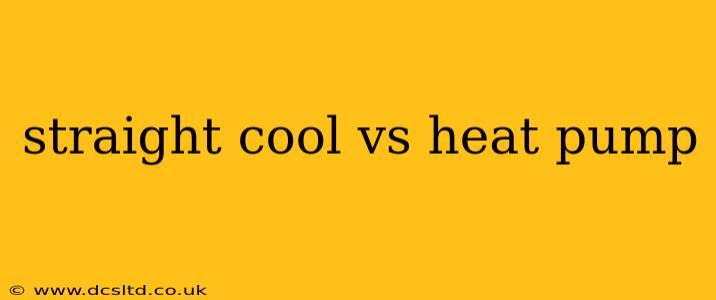Straight Cool vs. Heat Pump: Which is Right for Your Home?
Choosing between a straight cool air conditioner and a heat pump can significantly impact your home's comfort and energy bills. Both systems cool your home, but they differ significantly in their functionality and efficiency. This comprehensive guide will help you understand the key differences to make an informed decision.
What is a Straight Cool Air Conditioner?
A straight cool air conditioner, also known as a single-stage air conditioner, is designed solely for cooling. It works by drawing in warm air, passing it over a cold refrigerant coil, and expelling the now-cooled air back into your home. These systems are generally less expensive to purchase than heat pumps but lack the heating functionality. They're a straightforward solution for homes in areas with mild winters where supplemental heating is readily available.
What is a Heat Pump?
A heat pump is a highly efficient system that provides both heating and cooling. In cooling mode, it operates similarly to a straight cool air conditioner. However, during winter, it reverses the process, extracting heat from the outside air (even in cold temperatures) and transferring it into your home. This makes them a more versatile and often more energy-efficient option in areas with moderate winters.
H2: What are the pros and cons of each system?
Let's delve into the advantages and disadvantages of each system:
Straight Cool Air Conditioner Pros:
- Lower Initial Cost: Straight cool AC units typically have a lower upfront purchase price than heat pumps.
- Simplicity: These systems are simpler in design, potentially leading to easier maintenance and repairs.
Straight Cool Air Conditioner Cons:
- No Heating Capability: They only provide cooling, requiring a separate heating system (like a furnace or electric baseboard heaters).
- Less Energy Efficient (Overall): While efficient at cooling, the need for a separate heating system means higher overall energy consumption for year-round climate control.
Heat Pump Pros:
- Heating and Cooling: Provides both functions in one system, eliminating the need for a separate furnace or boiler.
- High Energy Efficiency: Significantly more energy-efficient than traditional heating systems, especially in milder climates. Many heat pumps qualify for energy rebates and tax credits.
- Quiet Operation: Heat pumps generally operate more quietly than many traditional heating systems.
Heat Pump Cons:
- Higher Initial Cost: The upfront cost of purchasing and installing a heat pump is generally higher than a straight cool AC unit.
- Reduced Efficiency in Extreme Cold: While technology is improving, heat pump efficiency can decrease in very cold climates. A supplemental heating source might be necessary in extremely frigid temperatures.
- Potential for Frosting: In colder conditions, ice can form on the outdoor unit, potentially impacting efficiency if not properly addressed.
H2: Which is more energy-efficient?
Generally, heat pumps are more energy-efficient overall, especially if you consider both heating and cooling needs. Straight cool air conditioners are efficient at cooling, but the addition of a separate heating system increases overall energy consumption. The efficiency of a heat pump can vary depending on the climate and the specific model.
H2: Which system is better for my climate?
The best choice depends heavily on your climate. Straight cool air conditioners are suitable for regions with mild winters where supplemental heating is sufficient. Heat pumps excel in areas with moderate winters and are becoming increasingly viable even in colder climates thanks to advancements in technology, such as cold-climate heat pumps.
H2: How much does each system cost?
The cost varies widely based on factors like system size, features, installation complexity, and regional labor costs. However, as a general guideline, straight cool air conditioners typically have a lower upfront purchase price than heat pumps. The long-term energy savings of a heat pump can offset the higher initial investment over time.
H2: What is the lifespan of each system?
Both systems generally have a lifespan of 15-20 years with proper maintenance. Regular maintenance, including filter changes and professional inspections, is crucial to extend the life of either system.
Conclusion:
The choice between a straight cool air conditioner and a heat pump hinges on your specific needs, climate, and budget. Carefully weigh the pros and cons outlined above, considering factors like upfront cost, long-term energy efficiency, heating requirements, and local climate conditions. Consulting with a qualified HVAC professional is highly recommended to determine the best solution for your home.
